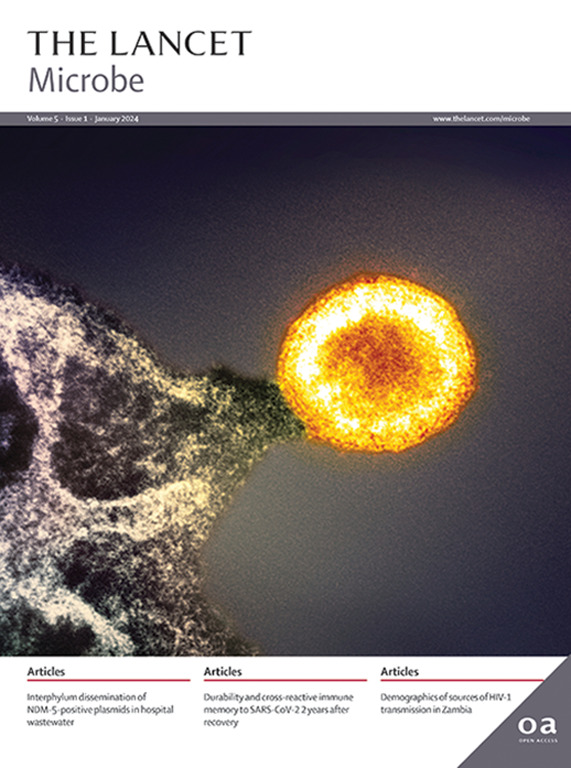撒哈拉以南非洲和西欧对SARS-CoV-2的免疫反应:一项回顾性、基于人群的横断面研究
IF 20.9
1区 生物学
Q1 INFECTIOUS DISEASES
引用次数: 0
摘要
背景:在撒哈拉以南非洲,与高收入国家相比,SARS-CoV-2与更高比例的无症状感染和更低的死亡率相关。然而,与世界高收入地区的人相比,目前缺乏非洲人对SARS-CoV-2细胞免疫反应的数据。我们的目的是评估外周和粘膜免疫反应的地理差异。方法:在这项以人群为基础的回顾性横断面研究中,我们分析了来自塞内加尔(塞内加尔队列)、荷兰和德国(欧洲队列)的7项临床研究的外周血和鼻刮拭样本。样本采集时间为2018年11月1日至2021年12月20日。我们纳入了来自无、轻度或重度COVID-19患者的样本。来自塞内加尔和加蓬的验证队列(n=64)用于验证主要队列的主要发现。按年龄、性别、病毒载量、感染严重程度和持续时间对不同地理区域的个体进行匹配,以解决混杂因素。我们通过飞行时间、光谱流式细胞术、ELISA和Luminex检测细胞、体液和细胞因子免疫反应。研究结果:我们纳入了133名个体(59名来自塞内加尔队列,74名来自欧洲队列)。与欧洲队列相比,塞内加尔队列中的轻度COVID-19与血液或鼻腔免疫细胞谱的任何统计学意义上的干扰无关,也与促炎细胞因子的增加无关,尽管如欧洲人所见,sars - cov -2特异性适应性免疫很容易被诱导。在严重的COVID-19中,塞内加尔和欧洲队列均出现淋巴细胞减少(塞内加尔:减少2.9倍,p= 0.0010,欧洲:减少1.6倍,p= 0.0046),血液中性粒细胞频率增加(塞内加尔:增加2.0倍,p= 0.0044,欧洲:增加1.3倍,p= 0.026),鼻黏膜CD66b+CD16low中性粒细胞(塞内加尔:增加9.9倍,p= 0.045,欧洲:增加392倍,p .解释:在SARS-CoV-2感染期间观察到的不同免疫轨迹为撒哈拉以南非洲报告的疾病病程减弱提供了可能的解释,并强调需要进一步研究未充分研究人群对SARS-CoV-2的免疫反应。资助:欧洲和发展中国家临床试验伙伴关系2计划(AIDCO)、LUMC Gisela Thier奖学金、荷兰研究理事会(NWO)、欧洲研究理事会和Leids大学基金会。本文章由计算机程序翻译,如有差异,请以英文原文为准。
Immune responses to SARS-CoV-2 in sub-Saharan Africa and western Europe: a retrospective, population-based, cross-sectional study
Background
SARS-CoV-2 has been associated with a higher proportion of asymptomatic infections and lower mortality in sub-Saharan Africa than high-income countries. However, there is currently a lack of data on cellular immune responses to SARS-CoV-2 in people living in Africa compared with people in high-income regions of the world. We aimed to assess geographical variation in peripheral and mucosal immune responses.
Methods
In this retrospective, population-based, cross-sectional study, we analysed peripheral blood and nasal curettage samples from seven clinical studies involving individuals from Senegal (Senegalese cohort), the Netherlands, and Germany (European cohort). Samples were collected between Nov 1, 2018, and Dec 20, 2021. We included samples from individuals with no, mild, or severe COVID-19. A validation cohort of individuals from Senegal and Gabon (n=64) was used to validate key findings from the main cohort. Matching of individuals between geographical regions by age, sex, viral load, and infection severity and duration was used to address confounding factors. We examined the cellular, humoral, and cytokine immune responses using cytometry by time of flight, spectral flow cytometry, ELISA, and Luminex.
Findings
We included 133 individuals (59 from the Senegalese cohort and 74 from the European cohort). In contrast to the European cohort, mild COVID-19 in the Senegalese cohort was not associated with any statistically significant perturbations in blood or nasal immune cell profiles, nor with increased pro-inflammatory cytokines, although SARS-CoV-2-specific adaptive immunity was readily induced, as seen in Europeans. In severe COVID-19, both the Senegalese and European cohorts showed lymphopenia (Senegal: 2·9-times decrease, p=0·0010 vs Europe: 1·6-times decrease, p=0·0046) and increased neutrophil frequencies in blood (Senegal: 2·0-times increase, p=0·0044 vs Europe: 1·3-times increase, p=0·026) and the nasal mucosa CD66b+CD16low neutrophils (Senegal: 9·9-times increase, p=0·045 vs Europe: 392-times increase, p<0·0001). However, in contrast to Europeans, the Senegalese cohort had no significant expansion of immature immune populations, inflammasome activation, or monocyte recruitment to the nasal mucosa.
Interpretation
The observed divergent immunological trajectories during SARS-CoV-2 infection offer a potential explanation for the reported attenuated disease course in sub-Saharan Africa and highlight the need to further investigate immune responses to SARS-CoV-2 in understudied populations.
Funding
European and Developing Countries Clinical Trials Partnership 2 programme (AIDCO), LUMC Gisela Thier Fellowship, Dutch Research Council (NWO), European Research Council, and Leids Universitair Fonds.
求助全文
通过发布文献求助,成功后即可免费获取论文全文。
去求助
来源期刊

Lancet Microbe
Multiple-
CiteScore
27.20
自引率
0.80%
发文量
278
审稿时长
6 weeks
期刊介绍:
The Lancet Microbe is a gold open access journal committed to publishing content relevant to clinical microbiologists worldwide, with a focus on studies that advance clinical understanding, challenge the status quo, and advocate change in health policy.
 求助内容:
求助内容: 应助结果提醒方式:
应助结果提醒方式:


